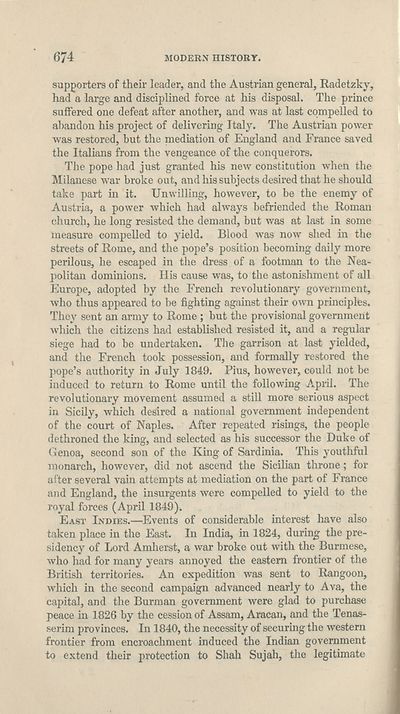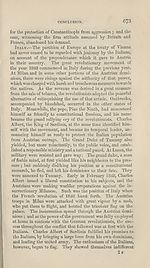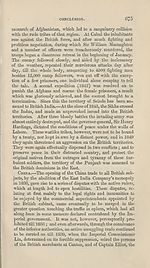Download files
Complete book:
Individual page:
Thumbnail gallery: Grid view | List view

674
MODERN HISTORY.
supporters of their leader, and the Austrian general, Radetzky,
had a large and disciplined force at his disposal. The prince
suffered one defeat after another, and was at last compelled to
abandon his project of delivering Italy. The Austrian power
was restored, but the mediation of England and France saved
the Italians from the vengeance of the conquerors.
The pope had just granted his new constitution when the
Milanese war broke out, and his subjects desired that he should
take part in it. Unwilling, however, to be the enemy of
Austria, a power which had always befriended the Roman
church, he long resisted the demand, but was at last in some
measure compelled to yield. Blood was now shed in the
streets of Rome, and the pope’s position becoming daily more
perilous, he escaped in the dress of a footman to the Nea¬
politan dominions. His cause was, to the astonishment of all
Europe, adopted by the French revolutionary government,
who thus appeared to be fighting against their own principles.
They sent an army to Rome ; hut the provisional government
which the citizens had established resisted it, and a regular
siege had to be undertaken. The garrison at last yielded,
and the French took possession, and formally restored the
pope’s authority in July 1849. Pius, however, could not be
induced to return to Rome until the following April. The
revolutionary movement assumed a still more serious aspect
in Sicily, which desired a national government independent
of the court of Naples. After repeated risings, the people
dethroned the king, and selected as his successor the Duke of
Genoa, second son of the King of Sardinia. This youthful
monarch, however, did not ascend the Sicilian throne; for
after several vain attempts at mediation on the part of France
and England, the insurgents were compelled to yield to the
royal forces (April 1849).
East Indies.—Events of considerable interest have also
taken place in the East. In India, in 1824, during the pre¬
sidency of Lord Amherst, a war broke out with the Burmese,
who had for many years annoyed the eastern frontier of the
British territories. An expedition was sent to Rangoon,
which in the second campaign advanced nearly to Ava, the
capital, and the Burman government were glad to purchase
peace in 1826 by the cession of Assam, Aracan, and the Tenas-
serim provinces. In 1840, the necessity of securing the western
frontier from encroachment induced the Indian government
to extend their protection to Shah Sujah, the legitimate
MODERN HISTORY.
supporters of their leader, and the Austrian general, Radetzky,
had a large and disciplined force at his disposal. The prince
suffered one defeat after another, and was at last compelled to
abandon his project of delivering Italy. The Austrian power
was restored, but the mediation of England and France saved
the Italians from the vengeance of the conquerors.
The pope had just granted his new constitution when the
Milanese war broke out, and his subjects desired that he should
take part in it. Unwilling, however, to be the enemy of
Austria, a power which had always befriended the Roman
church, he long resisted the demand, but was at last in some
measure compelled to yield. Blood was now shed in the
streets of Rome, and the pope’s position becoming daily more
perilous, he escaped in the dress of a footman to the Nea¬
politan dominions. His cause was, to the astonishment of all
Europe, adopted by the French revolutionary government,
who thus appeared to be fighting against their own principles.
They sent an army to Rome ; hut the provisional government
which the citizens had established resisted it, and a regular
siege had to be undertaken. The garrison at last yielded,
and the French took possession, and formally restored the
pope’s authority in July 1849. Pius, however, could not be
induced to return to Rome until the following April. The
revolutionary movement assumed a still more serious aspect
in Sicily, which desired a national government independent
of the court of Naples. After repeated risings, the people
dethroned the king, and selected as his successor the Duke of
Genoa, second son of the King of Sardinia. This youthful
monarch, however, did not ascend the Sicilian throne; for
after several vain attempts at mediation on the part of France
and England, the insurgents were compelled to yield to the
royal forces (April 1849).
East Indies.—Events of considerable interest have also
taken place in the East. In India, in 1824, during the pre¬
sidency of Lord Amherst, a war broke out with the Burmese,
who had for many years annoyed the eastern frontier of the
British territories. An expedition was sent to Rangoon,
which in the second campaign advanced nearly to Ava, the
capital, and the Burman government were glad to purchase
peace in 1826 by the cession of Assam, Aracan, and the Tenas-
serim provinces. In 1840, the necessity of securing the western
frontier from encroachment induced the Indian government
to extend their protection to Shah Sujah, the legitimate
Set display mode to:
![]() Universal Viewer |
Universal Viewer | ![]() Mirador |
Large image | Transcription
Mirador |
Large image | Transcription
| Antiquarian books of Scotland > Education > Elements of universal history on a new and systematic plan > (694) |
|---|
| Permanent URL | https://digital.nls.uk/127588468 |
|---|
| Description | Thousands of printed books from the Antiquarian Books of Scotland collection which dates from 1641 to the 1980s. The collection consists of 14,800 books which were published in Scotland or have a Scottish connection, e.g. through the author, printer or owner. Subjects covered include sport, education, diseases, adventure, occupations, Jacobites, politics and religion. Among the 29 languages represented are English, Gaelic, Italian, French, Russian and Swedish. |
|---|

